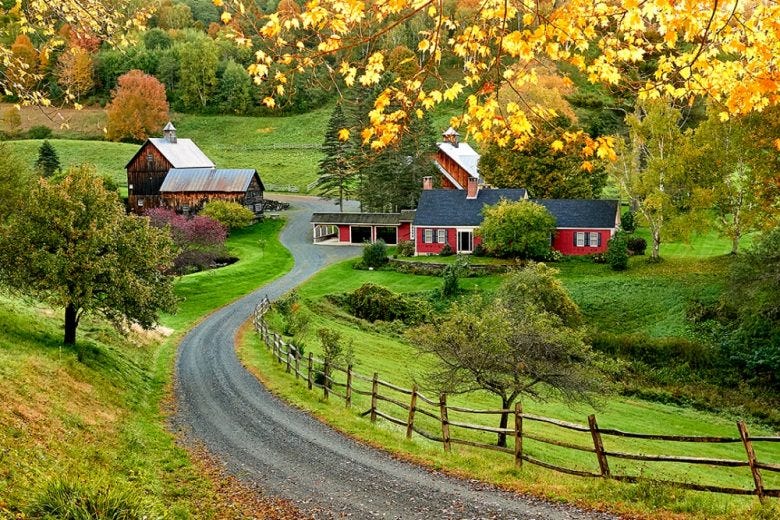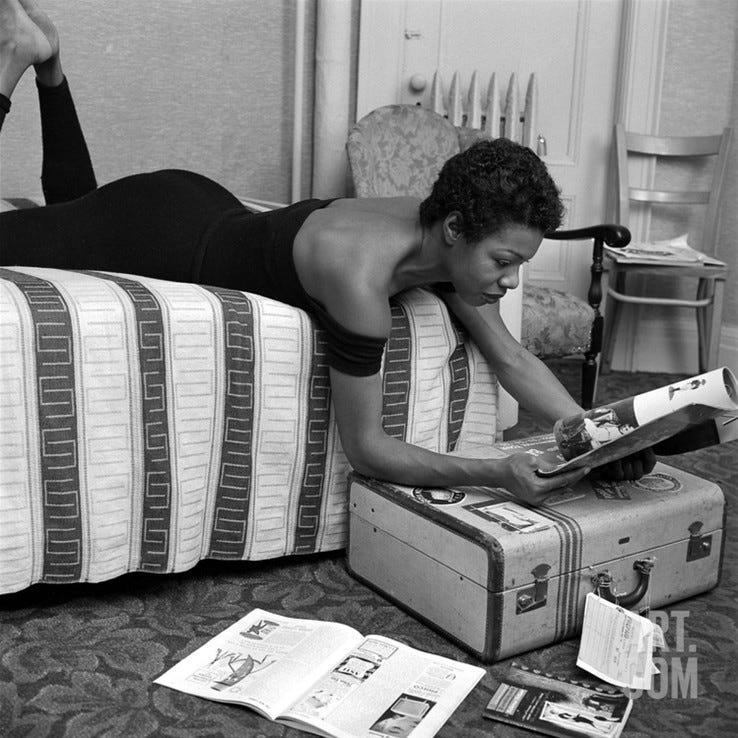Edition #65: What If I Never Get "Good" At Social Media?
Plus, self-compassion is not self-indulgence, a farm stay in Vermont and a poem by Maya Angelou
A Note From the Editor
I will always have a running to-do list, though my relationship with the list has waxed and waned over the years. It used to be my bible, something to be worshipped and adhered to above all else; the knob that allowed me to dial up the internal pressure with the click of a ballpoint pen. Eventually, I learned to allow myself a healthier distance between checked-off tasks and self-worth, realizing that the world does not stop spinning when I don’t pick up laundry/send email/order gift/revise story. There’s one item on my to-do list, however, that has been there for nearly a year now. It hovers towards the top and makes me feel racy and avoidant in its omnipresence: get better at social media.
In a way, this muscular task has always been “on my list,” but only recently did it start to feel vital. I was mainly thinking about how I might be able to distill the content from this newsletter into an Instagram feed. My friends, all supportive and well-meaning, said I was missing out, not transferring this content over. “I know!” I would say before returning to the to do list, underlining the task three times as though that might grant me the motivation to try harder. But the barrier to entry felt high. If I were trying to do it right I would need to have a knack for graphic design, which I do not have, nor do I care to learn. Also, there was a matter of time. Writing, editing, and curating content takes time, alongside a full-time job and other creative writing endeavors. More time turning content into social media posts would mean less time doing what I actually want to do; writing. Then there’s the matter of social media as a creative block. Any time I have an idea for a new project, the first question that pops into my mind is how will I make this work on social? In what format, on what page, at what frequency?
My initial response to all of this is to stop making excuses, to buck up, and just do it. Everyone else is figuring out how to balance a million other things with posting frequently, so why can’t you? Worse, I fear if I don’t post enough, I will be forgotten. Left behind. But I’ve already been left behind by that measure—I just got back on Twitter and I’m still trying to find my groove on Instagram, and just like that, TikTok is a main contender. Then there’s Clubhouse, which many are saying is the future of social. I can dig as fast as I can, but there will always be a dump truck pouring dirt into the hole at a speed I cannot physically keep up with. This is the nature of social media; it is fluid and relentless and it never turns off and you’ll never be doing enough, but doing nothing doesn’t feel like an option. Social media feels like a requirement, a tool we are all supposed to have the ability to master, whether you’re a creator or a writer, a doctor or a chef or a teacher. Your job is no longer enough. You must now also do this and do it all the time and do it exponentially well.
As the impending “get better at social media” action item has loomed on my list, I’ve made some attempts to have a go at it. I’ve started Tweeting for the first time in years. I talk to the camera on Instagram when I’m feeling confident, to promote this newsletter. As such, I’ve found my mind often begins to filter real life through the lens of prospective social media posts. If I’m on a run and I overhear a group of well-dressed Millennials talking about a dinner party, I wonder what form the observation might take in a Tweet (why does every Millennial want to be the type of person who hosts and attends dinner parties?). If the sunset is silky and buttery, I might consider how to frame the image for an Instagram story, whether it should be static or a looping video. I don’t even have a TikTok, and yet my mind still creates short videos based on the silly things I experience on the streets of New York. This thought loop feels like the opposite of freedom, the opposite of real life. It’s living distilled into a digital format and it’s happening in my brain; the brain of a person who isn’t even hyperactive on social.
I recently had what felt like a radical thought: what if social media just isn’t for me, what if I’ll never feel comfortable with it, and what if that’s OK? In the midst of the to-do list and of life, I’ve forgotten that the task of partaking in social media is optional, though it rarely feels that way for aspiring creatives. I recently spoke to an artist who expressed a nearly identical sentiment. He shared the level of anguish he used to feel before posting, the way he would analyze his content with such severe scrutiny that it was impossible to feel authentic—no surprise, as social media is the antithesis of authenticity—paired with the relentless need to post more and more and more. It drained him, and eventually, he took a step back from it. In this less digitally connected space he found a deeper level of peace, and I remembered that this is all optional. Extra. That the world will continue to evolve and to throw tools and tech at us to play with or to monetize or to live by, but they are just tools and tech. They aren’t real life. They aren’t the smell of newly blossomed lilies or the feeling of fingers loosely interlaced. They aren’t sitting on a bench in the sun. They aren’t eye contact across the room or teeth sinking in to a ripe orange or a quickened heartbeat. They are simulations of real life, artificial and fleeting
Cheers my dears, and as always, thanks for reading. While I realize the “social media is draining” narrative is far from an original thought, I’d still love to hear your take on it. Does posting feel heavy to you, or is it light and easy? Do you have to be active on social for your job or your side project? Can you imagine a world off of it?
Three Pieces of Content Worth Consuming
Self-Compassion is Not Self-Indulgence. A thoughtful take on self-compassion from a trained clinical psychologist. In what should be intuitive but wasn't for me, she suggests the first and most vital step in cultivating self-compassion is recognizing when you're suffering. There is a fear I've held (and heard expressed) that self-compassion is indulgent and breeds laziness; that if we go too easy on ourselves we will become stagnant, but this piece makes a case for why that belief is neither productive nor true. You don’t have to be your own bully, and you’ll be better off for it.
“We grow up learning to follow the golden rule: ‘Treat others how you want to be treated.’ Yet many of us receive no guidance on how to be a friend to ourselves”
Evanston, Illinois Becomes the First U.S. City to Pay Reparations to Black Residents. A beacon of light after another dark week in America. Firstly, if you don’t hold a firm stance on whether or not you support reparations (a form of compensation for wrongdoing ) for Black people in America, read this piece and get familiar with H.R. 40. A city council in Chicago has allocated $400,000 to be doled out in increments of $25,000 per qualifying household, for those Black people who lived in Evanston up until 1969 and who suffered from known housing discrimination laws. The money is to be used for home repairs or for a downpayment on a home; a direct correlation between what was withheld in the past. The funds were raised through donations and a 3% sales tax on recreational marijuana. It’s amazing what a small City Council can do when it comes to problem-solving and making things right (see: the basic-income experiment in Stockton, CA).
Bullshit Jobs: Why They Exist and Why You Might Have One. Though I tend to detest conversationally formatted articles (feels lazy, right?), this one struck a chord. Do you feel like you have a bullshit job? (The litmus test: if your job was eliminated tomorrow, would your company be able to function as normal?) The author of this book argues you probably do, that many people do, and that our current value system relies on these bullshit jobs to prop up the wealthiest people (who are commended for creating "more jobs"), leaving those with crucial jobs, like teachers and garbage men, severely underpaid and creating an entire middle class of people who know their work is unimportant, who are left with decent salaries but feelings of uselessness. The author suggests a rather radical solution to this seemingly impossible problem: a shifted value system, a movement in which we can find ways to reward those who do work that isn't bullshit but that isn't currently financially rewarded, like volunteer work. Feels far off but also, I wish.
“We imagine that if we take people’s work away, they’ll just sit around, drink beer, watch TV, and be depressed all day. But we just don’t have any experience of having time, but societies that do come up with all sorts of things to do.”
Perhaps You Should…
Apply for a Farm Work Stay Vermont
I originally read about this three to six-month Farm Work Stay Residence in Vermont on Listings Project, and my mind was instantly transported to my magical (non-farming) time spent in the state last fall. If your current situation allows, why not try out a different life for a few months? You might be surprised at what you discover about yourself in the process. If you do apply for the program and get accepted, please report back and tell me how it went.
**Bonus Content** (A Phenomenal Poem)
Somehow, I hadn’t read the late Dr. Maya Angelou’s poem, Phenomenal Woman, until this week—but better later than never. You can listen to her read it here. It makes me feel capable and strong and empowered and proud to be a woman.
I walk into a room
Just as cool as you please,
And to a man,
The fellows stand or
Fall down on their knees.
Then they swarm around me,
A hive of honey bees.
I say,
It’s the fire in my eyes,
And the flash of my teeth,
The swing in my waist,
And the joy in my feet.
I’m a woman
Phenomenally.
A Quote From A Book You Should Read:
“I didn’t want the same things that they wanted, and they should know this. They should know my difference, they should sense my unfathomable fucking depths.”
-Severance by Ling Ma
This newsletter is best served with a side of conversation, so drop your opinions, reflections, and thoughts in the comments below and let’s get to talking.
Or, share the most thought-provoking piece from today’s edition with someone you love, then call them up to discuss, debate, and percolate. As a wise woman once said, “Great minds discuss ideas.”







Feel you!!